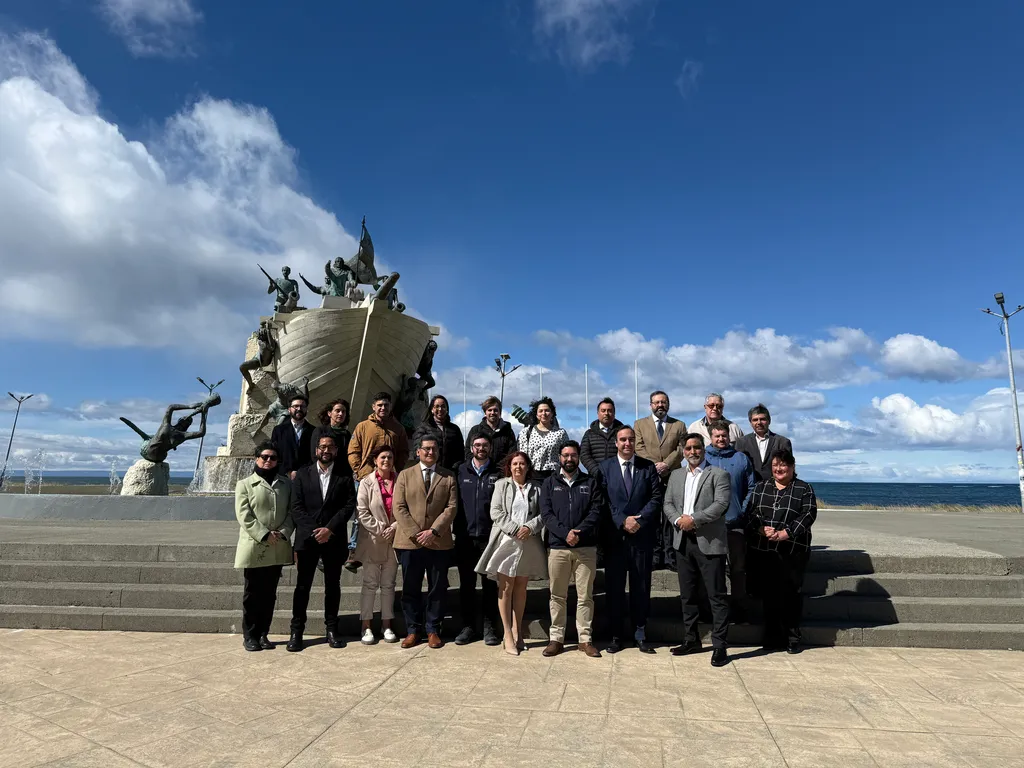Ministry of the Environment and University of Magallanes Present Results of the Public Baseline Project in Punta Arenas

The Ministry of the Environment, through the Sustainable Productive Development Program (DPS) and in collaboration with the University of Magallanes, held seminars and workshops to present the results of the Public Baseline Project (LBP) —an initiative that gathered and systematized key information on terrestrial and marine ecosystems across the region.
The presentation of results took place in Punta Arenas, led by Deputy Minister of the Environment Maximiliano Proaño, together with Regional Governor of Magallanes Jorge Flies; Presidential Delegate José Antonio Ruiz; Regional Ministerial Secretary of Economy Marlene España; Regional Ministerial Secretary of the Environment Enrique Rebolledo; Regional Ministerial Secretary of Science Verónica Vallejos; University of Magallanes Rector José Maripani; Regional Director of CORFO Magallanes María José Navajas; Head of the Department of Environmental Economics Álvaro Shee; and LBP Program Director Sebastián Abades.
Deputy Minister Maximiliano Proaño highlighted that this project marks a milestone in generating environmental data in partnership with academia:
“Magallanes is paving the way toward a new way of managing its territory based on evidence, recognizing the value of its natural capital as a foundation for sustainable development. The challenge now is to move toward monitoring strategies that strengthen the platform and ensure its usefulness for decision-making with local impact and long-term vision.”
Aintzane Lorca, Head of the Sustainable Productive Development Division at the Ministry of Economy, emphasized that:
“The Public Baseline initiative is a fundamental tool for promoting data-driven decision-making in the territories. Through the DPS Program, we seek to integrate science, technology, knowledge, and innovation (CTCi) into productive development instruments, and the LBP project does exactly that —it enables more robust, transparent, and efficient territorial planning, while fostering private investment that incorporates natural capital as a key driver for a sustainable economy.”
Regional Governor Jorge Flies added:
“Having knowledge of the region’s biological and ecosystemic wealth is extraordinary—not only for what we possess but because when we develop productive functions, we must do so with sustainability, conservation, and often even restoration in mind. To make those decisions, we need information. What the Ministry of the Environment and the University of Magallanes have achieved makes us proud and positions our region in a privileged place within the country.”
Scientific and Territorial Advances
The seminars, held on October 16 and 17, presented the main results of the study conducted by the University of Magallanes, led by researcher Erika Mütschke from the Patagonia Institute (UMAG). Rector José Maripani praised Mütschke’s work, noting that “it has been a great challenge for the university and for each of the professionals involved in this major project.” Mütschke added that the region “has been a pioneer in this kind of territorial research at the national level,” leveraging decades of scientific work and the extensive collections gathered by UMAG researchers.
The event also included presentations from the Transforma Green Hydrogen Magallanes Program, focusing on local supplier development and human capital formation for the emerging green hydrogen industry. These talks were given by Mauricio Ojeda, founding partner of Grupo Singular, and María Luisa Ojeda, researcher at the Center for Energy Resource Studies (CERE) at UMAG.
In addition, participatory workshops were held to gather local stakeholders’ perceptions, needs, and suggestions regarding the use of the platform. Using a collaborative methodology, participants worked in groups to prioritize aspects such as accessibility, visualization, and the practical application of environmental data, aiming to strengthen the platform’s public utility.
Regional Ministerial Secretary of the Environment Enrique Rebolledo Toro underscored the importance of the initiative:
“It is about democratizing information —making it accessible to everyone: decision-makers, the community, and the private sector. With this data, we can decide what and where to protect, and also prioritize areas for environmental compensation.”
A Milestone in Environmental Characterization of Magallanes
The study conducted by the University of Magallanes represents a landmark in the environmental characterization of the region, covering over 3 million hectares across the provinces of Magallanes and Tierra del Fuego. The results identified more than 317,500 organisms belonging to 928 species across terrestrial and marine ecosystems —establishing an unprecedented foundation for environmental monitoring.
Among the key findings were a high diversity of fungi and lichens, and the presence of six native carnivore species, including the puma, lesser grison (quique), and Geoffroy’s cat. In wetlands, the analysis of temporary water bodies was included for the first time, revealing zones of high ecological and archaeological value. In the marine environment, 75 species of macroalgae were identified, along with invasive species, underscoring the need for ongoing coastal monitoring.
The study also applied environmental DNA (eDNA) techniques to detect native and exotic species in rivers, demonstrating its potential as a tool for ecosystem management and conservation. As part of the project’s legacy, a methodological guide and a proposal for an environmental monitoring program were developed, aligned with national and international standards —laying the groundwork for future scientific continuity and sustainable territorial management.
All data generated by the Public Baseline Program (LBP) is publicly available at: https://lineasdebasepublicas.mma.gob.cl
